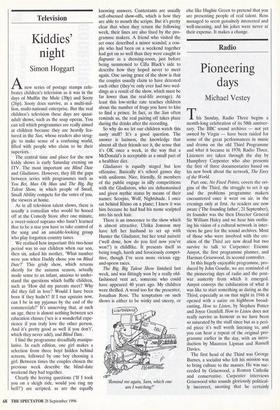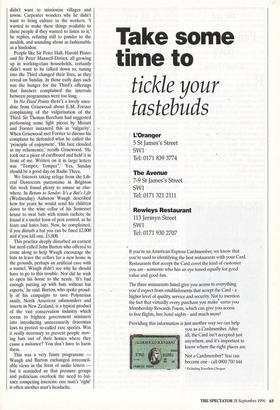Radio
Pioneering days
Michael Vestey
This Sunday, Radio Three begins a month-long celebration of its 50th anniver- sary. The BBC sound archives — not yet owned by Virgin — have been raided for some of the great performances in music and drama on the old Third Programme and what it became in 1970, Radio Three. Listeners are taken through the day by Humphrey Carpenter who also presents the first of three documentaries based on his new book about the network, The Envy of the World.
Part one, No Fixed Points, covers the ori- gins of the Third, the struggle to set it up and the problems programme makers encountered once it went on air, in the evenings only at first. As readers are now aware (`The founding father', 21 September), its founder was the then Director General Sir William Haley and we hear him outlin- ing his vision of a cultural network in inter- views he gave for the sound archives. Most of those who were involved with the cre- ation of the Third are now dead but two survive to talk to Carpenter: Etienne Amyot, the first programme planner, and Harman Grisewood, its second controller.
In this hugely enjoyable programme, pro- duced by John Goudie, we are reminded of the pioneering days of radio and the post- war austerity from which it emerged. Amyot conveys the exhilaration of what it was like to start something as daring as the Third, especially as on that night in 1946 it opened with a satire on highbrow broad- casting, How to Listen, by Stephen Potter and Joyce Grenfell. How to Listen does not really survive as humour as we have been so saturated by the stuff since but as a peri- od piece it's well worth listening to, and you can hear a repeat of the original pro- gramme earlier in the day, with an intro- duction by Maureen Lipman and Russell Davies.
The first head of the Third was George Barnes, a socialist who felt his mission was to bring culture to the masses. He was suc- ceeded by Grisewood, a Roman Catholic and conservative. Carpenter interviews Grisewood who sounds gloriously political- ly incorrect, snorting that he certainly
didn't want to missionise villages and towns. Carpenter wonders why he didn't want to bring culture to the workers. 'I wanted to make these things available to these people if they wanted to listen to it,' he replies, refusing still to pander to the modish, and sounding about as fashionable as a Smilodon.
People like Sir Peter Hall, Harold Pinter and Sir Peter Maxwell-Davies, all growing up in working-class households, certainly didn't want to be talked down to; tuning into the Third changed their lives, as they reveal on Sunday. In those early days such was the hunger for the Third's offerings that listeners complained the intervals between programmes were too long.
In No Fixed Points there's a lovely anec- dote from Grisewood about E.M. Forster complaining of the vulgarisation of the Third. Sir Thomas Beecham had suggested performing some light pieces by Mozart and Forster instanced this as 'vulgarity'. When Grisewood met Forster to discuss his complaint he defended what he called the 'principle of enjoyment'. 'His face clouded at my vehemence,' recalls Grisewood. 'He took out a piece of cardboard and held it in front of me. Written on it in large letters was "Temper, Temper".' Yes, Sunday should be a good day on Radio Three.
We listeners taking refuge from the Lib- eral Democrats pantomime in Brighton this week found plenty to amuse us else- where. In Return to Sender: It's a Bat's Life (Wednesday) Auberon Waugh described how for years he would send his children down to the wine cellar of his Somerset house to swat bats with tennis rackets; he found it a useful form of pest control, as he fears and hates bats. Now, he complained, if you disturb a bat you can be fined £2,000 and if you kill one, £5,000.
This practice deeply disturbed an earnest bat nerd called John Burton who offered to come along to help Waugh encourage the bats to leave the cellars for a new home in the grounds, perhaps an artificial cave with a tunnel. Waugh didn't see why he should have to go to this trouble. Nor did he wish to open his home to the nerds. 'It's bad enough putting up with bats without bat experts,' he said. Burton, who spoke proud- ly of his campaigns to save Polynesian snails, North American salamanders and insects in New Zealand, is a typical product of the vast conservation industry which seems to frighten government ministers into introducing unnecessarily draconian laws to protect so-called rare species. Was it really necessary to prevent people mov- ing bats out of their homes where they cause a nuisance? You don't have to harm them.
This was a very funny programme Waugh and Burton exchanged irreconcil- able views in the form of audio letters but it reminded us that pressure groups and politicians overlook the need to bal- ance competing interests: one man's 'right' is often another man's headache.



















































































 Previous page
Previous page